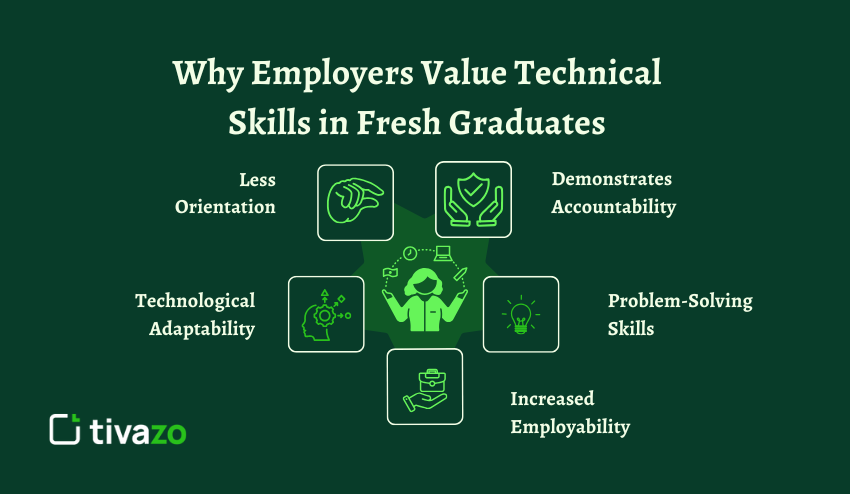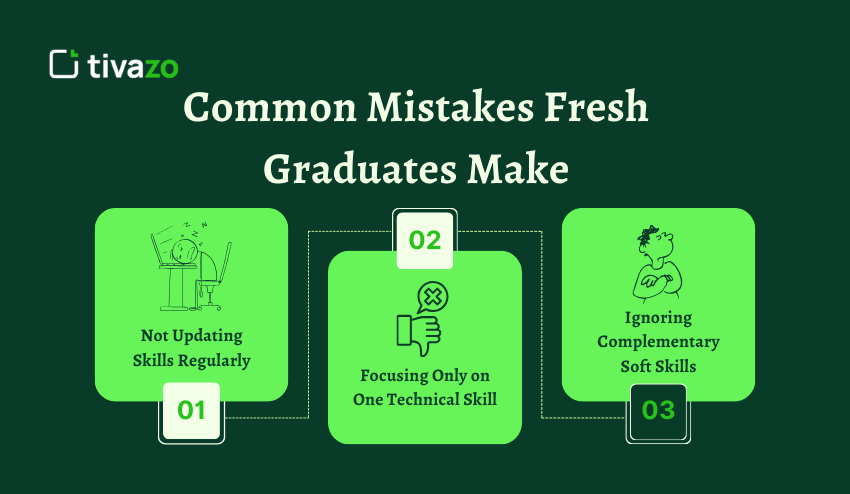The entry-level job competition has never been so dense. Graduates now encounter increasingly large numbers of candidates and more demanding employers than they have ever experienced before. A degree is not sufficient anymore to shine. It is these technical skills employers prize above all that really differentiate you.
Employers especially those who hire fresh graduates always prefer those who take initiative to build and show technical competence as they tend to learn new things in the work place at a faster rate and be more productive. All these competencies not only enhance employment opportunities; it also lessens the amount of learning once you land a job in an organization.
This article takes a closer look at the best technical skills employers will be seeking in 2025, their importance in your career pursuit and what you can do to perfect them before you take your first step into the professional world.
What Are Technical Skills?
Technical skills are the skills and knowledge in the field that are needed to do certain tasks in a job. They are usually acquired through education, training or experience. Examples are programming, data analysis, cybersecurity, cloud computing, and software expertise.
In contrast to soft skills, like communication, teamwork, or critical thinking, technical skills can be measured, and they can be applied to your everyday duties. As an example, SQL will enable you to query databases and Excel will enable you to analyze data correctly.
Technical skills are very important to understand since they are the basis of your profession. These skills are used by employers as a standard against which readiness and potential can be measured. In highly competitive industries, good technical abilities mean that a graduate can be useful right away.
Why Employers Value Technical Skills in Fresh Graduates
Employers place value on technical skills for new graduates because they have a direct effect on the productivity, efficiency, and long-term benefit of the new member of the organization. Here are some reasons the technical skills are important.

1. Less Orientation:
- Graduates who present strong technical skills can approach work as an independent from day one.
- Less dependence on seniors for help with orientation can positively affect onboarding costs and increase how quickly productivity will occur.
- For example, a graduate with tech skills in Excel, SQL, or data visualization can generate reports from these skills with little direction from a supervisor.
2. Demonstrates Accountability and Maturity:
- Technical skills can demonstrate an openness to learn and be accountable at work.
- When an employer sees candidates who developed skills of their own education and training proactively, the employer views the new employee to be self-motivated and dependable.
- For example, many companies use some combination of coding (Java, C#, web skills, etc.) to develop applications, and even a graduate with just the basics of programming can assist with those projects immediately.
3. Technological Adaptability:
- Most workplaces are constantly evolving with the introduction of new tools, platform usage, and software updates.
- Graduates with current technical skills typically will have a cultural adaptation, and will help the organization adapt to new solutions.
- For example, if a graduate learns basic cloud computing, they will be able to sometimes implement a cloud project using AWS or Azure without needing retraining.
4. Improved Problem-Solving Skills:
- Technical skills enable employees to spot problems, troubleshooting appropriately, and then suggest solutions.
- Graduates that know how to read and analyse data or independent route causes from process debugging can become parts of the innovation process.
- For example, a graduate that is data literate, can look for trends and suggest strategies that will produce significant changes in business outcomes.
5. Increased Employability and Career Progression:
- Graduates who are constantly developing and improving their technical skills will be viewed as long-term investments.
- Employers are looking for employees who can demonstrate their adaptability through a growth mindset in addition to their technical skills.
- For example, if a candidate is someone who has developed their skillset by learning new programming languages or software tools, they will remain relevant in the job market.
Employers often look for fresh graduates who combine these skills with a growth mindset. A graduate who continuously upgrades their technical skills is seen as an investment rather than a liability.
Top 10 Technical Skills for Fresh Graduates
1. Data Analysis
In all industries, the skill to read and manipulate data is a necessity. Employers desire graduates who are able to derive conclusions out of raw information to aid business decisions.
- Tools: Excel, SQL, Python, R
- Use Cases: Marketing analytics, sales forecasting, operational efficiency
2. Programming & Coding
Technical jobs rely on programming. Even rudimentary knowledge of coding can make you stand out in non-technical jobs which involve automation or reporting.
- Programming languages: Python, Java, C++
- Use Cases: Software development, data manipulation, automation
3. Digital Marketing Tools
The digital marketing competencies enable businesses to grow their online presence and to measure performance.
Resources: SEO, Google Analytics, social media sites
Effect: Evidence-based campaigns and better marketing ROI
4. Cloud Computing Basics
The key aspect of contemporary IT infrastructure is cloud platforms. Understanding of cloud services is becoming a requirement in entry level jobs.
- Platforms: Google Cloud, AWS, Azure
- Pros: scalability, teamwork, cost-saving
5. Cybersecurity Awareness
The issue of cybersecurity is on the rise in every business. Graduates with basic knowledge of security practices are able to prevent the possible breaches.
- Skills: VPNs, passwords, secure files
- Significance: Securing sensitive data and reputation of the company
6. Software Proficiency
Mastering software tools is productive and accurate in work.
- Tools: Microsoft Office, Google Workspace, software specific to the industry
- Examples: Making reports in excel or making presentations in power point
7. Technical Writing
Effective communication and standardization of the processes is achieved through clear documentation.
- Skills: Report writing, manuals, API documentation
- Advantage: Eliminates misconceptions and training errors
8. UI/UX & Design Tools
The knowledge of user experience enhances product adoption and usability.
- Softwares: Figma, Adobe XD, Photoshop
- Application: Creating user-friendly interface and enhancing customer satisfaction
9. Project Management Tools
In team work set-ups, it is important to manage tasks and workflows effectively.
- Tools : Asana, Trello, Jira
- Approaches: Agile, Scrum
- Result: Project completion and responsibility on time
10. Database Management & SQL
Critical business information is stored in databases. It is a good asset to know how to handle and query them.
- Skills: SQL, database design, normalization
- Use Case: Trend analysis, report generation, analytics support
Ways for Fresh Graduates to Apply Skill Development
You will learn technical skills through a well-balanced combination of learning through a structured setting and applying the skill through hands-on work. Graduates with experiences applying the skills will have higher confidence and be seen favourably by potential employers.
Some general suggestions:
1. Online Courses:

- Many online platforms such as Coursera, Udemy, PyNet Labs, and LinkedIn Learning offer structured learning paths, and some even provide job guarantee courses that ensure learners are career-ready upon completion.
- Many courses contained practical projects, quizzes, and/or case studies that can take on examples from actual industry examples and work.
- Example: After completing a course in Python, with hands-on exercises from the course and practical projects, the graduate is ready to apply their skills in automation or data analysis.
2. Internships and Volunteer Projects:
- Nothing is more valuable than practical experience. Through an internship or volunteer project, the graduate can apply the developing skills in a respected professional or semi-professional industry setting.
- Example: Joining a student tech initiative in their university, or volunteering to help a non-profit with web development giving them practical experience in a team setting as well as collaborative experience.
Personal Projects/Freelance Projects:
- You can reinforce your learning through building personal projects and demonstrating your own initiative.
- Freelance sites provide great opportunities for the graduate to join a foundation that helps address various real-world issues, manage and interact with clients, and complete projects as an independent or contractor.
- Example: Develop personal website, a small app, or a project visualizing data, as these type of projects will show you have applicable skills that clients would want. Graduates can rapidly build their technical skills and stand out to employers.
3. Universities and Events:
- Universities offer labs, hackathons, or coding competitions, and case challenges where students can gain practical experience in a controlled environment.
- This gives you an opportunity to collaborate with teammates and gain a sense of what it feels like to develop a solution to an unfamiliar problem with deadlines and limited resources.
- For example, having the experience of participating in a hackathon or hackfest as a student will not only improve your coding skills and methods, you will also learn to work and collaborate with team members under tight deadlines.
The combination of structured experience and practical experience give recent graduates a chance to develop their technical skills quickly and gain confidence and presence with prospective employers once they leave the university.
Common Mistakes Fresh Graduates Make
Although graduates may have good technical skills, there are some mistakes that can make them fail to maximize their potential. The following pitfalls are the most frequent ones, according to my experience of working with entry-level hires:

- Not Updating Skills Regularly
Technology is fast changing. Those graduates who depend only on what they have been taught in the university will be left behind. As a case in point, a new programming language or a framework or a cloud tool might supplant an older technology. It is important to ensure that you are constantly learning and upgrading your technical skills and learn self management in order to be competitive. - Focusing Only on One Technical Skill
It is good to specialize but it is also important not to be too specialized because it may restrict opportunities. Employers want graduates who are flexible and can work with a variety of tools and systems. As an example, being familiar with Excel is useful, but when it is combined with SQL or data visualization it makes a candidate much more desirable. - Ignoring Complementary Soft Skills
Technical skills arent only sufficient. Soft skills like critical thinking, communication, teamwork, and problem-solving complement the worth of your technical skills. An employee who is able to interpret the data in an understandable manner or work in a team environment is an asset to any employer.
Avoiding these pitfalls, fresh graduates can make their technical skills count more, increase their employability and demonstrate their readiness to meet professional challenges.
Soft Skills Complementing Technical Skills
Although technical skills are quite important, they are best when complemented with soft skills. Technical knowledge is no longer the only skill that employers want graduates to have; they also want graduates who can integrate technical knowledge with other skills such as critical thinking, problem-solving, and teamwork.
- Critical Thinking and Problem-Solving – Graduates who are able to solve problems through analyzing situations, recognizing problems and offering solutions are very valuable. To illustrate, a data analyst can draw conclusions out of data sets, but critical thinking enables them to understand what the conclusions can mean to business strategy.
- Communication and Teamwork – Technical expertise may not be enough to succeed when working in groups. The ability to clearly communicate technical concepts, work with cross-functional teams, forming synergy and translate ideas to various audiences makes projects run smoothly.
- Why Employers Value This Combination – A candidate with the combination of technical abilities and good soft skills is able to perform the tasks efficiently, be innovative and communicate the results effectively. This mix can be a difference between high-performing graduates and others and more appealing to hire.
Combining these soft skills with your technical knowledge builds a stronger profile, increases your employability and readies you to face the real world workplace challenges.
Conclusion
Technical skills today are not optional you need them from data analytics to cybersecurity. In today’s job market technical skills can boost the chances of landing a job, limit training, and portray professionalism.
Start learning now, keep practicing, and keep looking for a way to use what you have learnt. This proactive engagement in developing technical skills can position you, as a fresh graduate, in a more promising employment position, ultimately a hopefully successful career.




